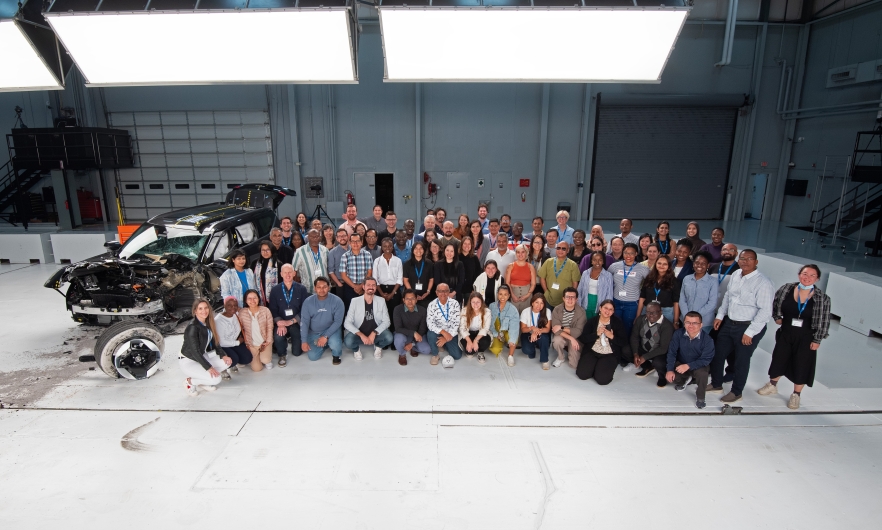The Global Road Safety Leadership Course 2024 Trains 61 Professionals in Baltimore

The GRSLC 2024 cohort after witnessing a crash test at the IIHS facility in Ruckersville, Virginia.
From May 12 – 24, the Johns Hopkins International Injury Research Unit (JH-IIRU) and the Global Road Safety Partnership (GRSP) conducted the 2024 iteration of the Global Road Safety Leadership Course (GRSLC) in Baltimore, Maryland, USA.
With support from the Bloomberg Philanthropies Initiative for Global Road Safety (BIGRS), the course welcomed 61 participants from 20 countries across Asia, Africa, and Latin America. Its framework is built on the Safe Systems approach and includes a focus on strengthening data systems, enhancing enforcement, sustainable mobility, urban design, strategic communication, and more.
In addition to the impressive roster of road safety and leadership experts from GRSP, Johns Hopkins Bloomberg School of Public Health (JHBSPH), Vital Strategies, the World Health Organization (WHO), the Global New Car Assessment Programme (Global NCAP), the Global Designing Cities Initiative (GDCI), the Global Health Advocacy Incubator (GHAI), and the World Resources Institute (WRI), the course was honored to be joined by Roberto Cláudio Bezerra, former Mayor of Fortaleza, Brazil.
His contribution to the course was exceptional, as Bezerra detailed the evidence-based strategies and interventions that paved the way to Fortaleza’s improved road and cycling infrastructure and reduction of road crash-related fatalities. His insights and real-world examples, all of which prioritized people’s safety, provided invaluable lessons for the participants.
Together with comprehensive and interactive sessions, participants engaged with BIGRS leadership in New York City, where they also attended a walking tour of improved infrastructure designs guided by the GDCI. Subsequently, GRSLC 2024 attendees witnessed a car crash test at the Insurance Institute for Highway Safety (IIHS) in Ruckersville, Virginia. The demonstration was powerful and striking and created a hands-on understanding of the importance of vehicle safety features and standards.
“Working in road safety at a local level is challenging and change can feel slow,” commented Eliseo Gasca, Communications Officer for the BIGRS in Mexico City and a dedicated participant. “The course, the renowned speakers, and the multicultural group of experts from around the world boosted my spirit and inspired me to bring new ideas to my city to work on this pressing problem. The most valuable advice I'm taking with me is not to think outside of the box, but instead, just throw the box away.”
“The course has broadened my advocacy horizons. Throughout the two weeks, I gained greater insight on topics like vehicle safety, which inspired me to identify opportunities for policy advocacy for vehicle legislation in Africa,” said Oliva Nalwadda, FIA Foundation’s Africa Region Coordinator. “I also had the opportunity to network with experienced road safety leaders, which is a blessing in itself as it opens doors for multi-country collaboration.”
The GRSLC Alumni Fellows component of the course was held from May 9 – 11 and it brought together five fellows from Uruguay, Dominican Republic, Tanzania, Kenya, and the Philippines. This selected cohort of GRSLC alumni collaborated for a year with mentors from JH-IIRU, GRSP, and other internationally recognized organizations to design and implement road safety projects in their respective countries. The fellows also taught into the GRSLC, which provided a unique opportunity for cross-learning between participants and alumni.
JH-IIRU and GRSP extend their gratitude to BIGRS for their invaluable support in the development and delivery of the course. Additionally, both organizations look forward to keeping this momentum going by enhancing leadership, connecting road safety professionals around the world, and promoting evidence-based practices in the years to come.
Find more content on the courses using these hashtags: #GRSLC2024.
